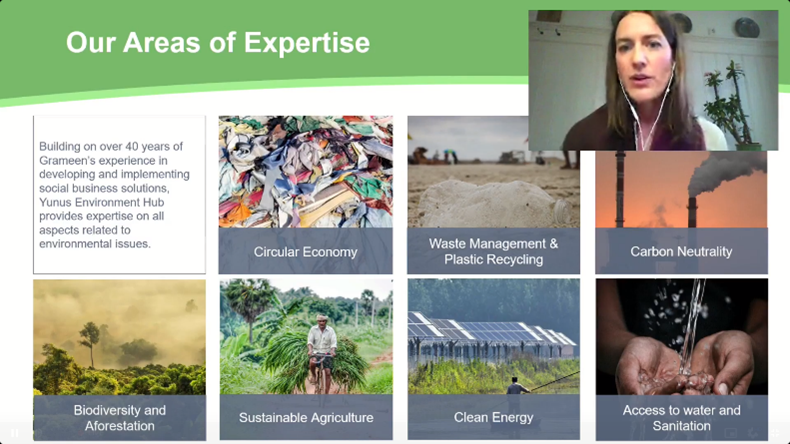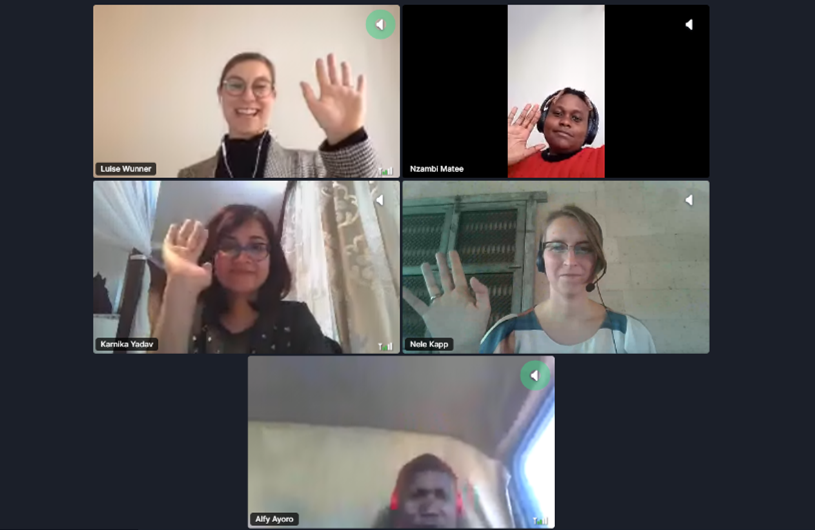On the second day of the inaugural East Africa Social Business Forum, Yunus Environment Hub presented its three-year program to address environmental degradation and youth unemployment in the region. Included was the announcement of the launch of StartNow to support young East Africans to create social business plans. A lively panel discussion with local experts on the issue of waste management and the potential of social business for creating a circular economy followed.
Beginning the session with a splash, Christina Jäger, Managing Director of the Yunus Environment Hub, announced the launch of the self-learning platform “StartNow” which supports local social business entrepreneurs in their process of business plan creation. The “GrowUp” incubator program offers tailored mentoring, networking opportunities and capacity building workshops to early-stage, post-revenue green social businesses. It complements the program to widen its scope of target audience.

Finally, for the Zero Plastic Waste Cities program, a feasibility study is being conducted in four cities in the East African Region to address municipal solid waste management. Through stakeholder workshops and ideation sessions, social business solutions will be identified to tackle plastic leakage into the environment while improving livelihoods of marginalized people such as waste pickers.
YY Panel: Building a Circular Economy
The following panel discussion on “Building a Circular Economy: Social Business as a Solution for Plastic and Waste Management” featured various local experts representing different stakeholders. Nele Kapp from UN-Habitat, community mobilizer Alfy Ayoro from Kibra Green, social business founder Nzambi Matee and Karnika Yadav representing Intellecap, shared their thoughts and experiences on the topic of waste management in East Africa.
Rapid urbanization leading to unplanned growth of urban settlements was pointed out as an issue. It makes waste management more difficult and affects countless livelihoods. Additionally, there is a lack of coordination between actors involved in tackling this issue. This unorganized approach and lack of governmental attention to structured solid waste disposal not only leads to waste leakage but also a loss of interest in the topic. Efforts of any community efforts undertaken outweigh the created impact. Increasing this impact was seen as the great potential of social businesses such as “Gjenge Makers” founded by Nzambi Matee which turns plastic waste into sustainable construction materials and aims to diversify into different types of waste as well as geographic regions in the next two years.
Building social business ventures in East Africa tackles the environmental problem of mismanaged waste. Simultaneously, it addresses another big regional issue of high unemployment rates, especially among youth, says Matee, who was recently awarded the Young Champion of the Earth award by the UN-Environment Programme. The sustainable creation of new jobs and a scalable impact in reducing waste leakage into the environment are therefore directly achievable by social businesses. However, focus must exceed their creation and focus on long-term scaling of innovative business solutions, highlights Karnika Yadav. Only then will impact be felt on the ground so that the needed community interest backed by governmental regulations can return as called for by Alfy Ayoro.

Tackling the issue of waste management at the root means addressing waste segregation at a household level as the panelists agreed. Nele Kapp explained that an increase in living standards in the region as a focus of many development collaborations would also lead to improved waste management infrastructure and consequently less leakage into the environment. It was agreed upon that the moral obligations of multinational corporates producing much of the waste as well as national and local governmental responsibilities need to be emphasized and actors held accountable. With the focus of the panel discussion on urbanity a final point was made to assure that all educational efforts, research and development in social business creation and regulatory frameworks must not forget the large parts of population living in a rurality. Impact created through social business solutions must and can reach everyone alike.